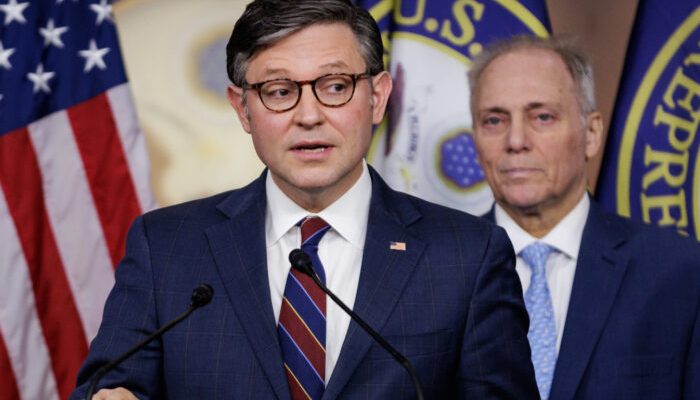House Speaker Mike Johnson is establishing a new panel to examine the Democrat-led January 6 Committee, following allegations that its members concealed or destroyed evidence that could have cleared President Donald Trump.
The original committee was chaired by Rep. Bennie Thompson (D-Miss.) and then-Rep. Liz Cheney (R-Wyo.), and was primarily selected by then-House Speaker Nancy Pelosi (D-Calif.). In an unprecedented move, Pelosi did not permit the Republican minority to appoint their own members, leading then-House Minority Leader Kevin McCarthy (R-Calif.) to withdraw from the process entirely.
Ultimately, former GOP Rep. Adam Kinzinger of Illinois, who had also distanced himself from Trump, joined Cheney on the committee.
Rep. Barry Loudermilk, a Republican from Georgia, will lead the forthcoming select subcommittee, which will operate under the House Judiciary Committee. Loudermilk previously conducted an investigation into the events of January 6 within the House Administration Committee and had long urged Johnson to establish a separate inquiry.
As this new panel will be designated as a “select” subcommittee, the Speaker will have exclusive authority to determine its membership.
This development occurs as several Republicans, including Johnson, have dismissed inquiries regarding President Trump’s decision to pardon nearly all individuals convicted for their involvement in the January 6 riot at the U.S. Capitol. Most of those pardoned faced low-level misdemeanor charges, although some were convicted of assaulting law enforcement officers.
“House Republicans take pride in our efforts to reveal the misleading narratives propagated by the politically motivated January 6 Select Committee during the 117th Congress, but there remains more to accomplish,” Johnson stated. “We are forming this Select Subcommittee to further our mission of uncovering the complete truth that the American people deserve.”
Loudermilk expressed his aspiration to “reveal all the facts and embark on the challenging journey of implementing necessary reforms to prevent a recurrence of such a significant security lapse.”
Beyond security issues, Republicans have shown a keen interest in further probing the original January 6 select committee, as prior investigations have uncovered evidence that contradicts the Democrats’ initial claims regarding Trump’s responsibility and his purported actions during the riot.
In December, Loudermilk published a report evaluating the “failures and politicization” of the January 6 committee. This report advocates for a criminal investigation into Cheney, suggesting that she may have engaged in witness tampering by communicating with Cassidy Hutchinson, a former White House aide and pivotal witness.
At that time, Cheney responded by stating that Loudermilk’s report “willfully ignores the truth and the substantial evidence presented by the Select Committee, instead fabricating falsehoods and defamatory claims in an effort to obscure Donald Trump’s actions.”
The inclination towards prosecution may have influenced former President Biden’s decision, mere hours before leaving office, to issue preemptive pardons to the members of the January 6 select committee and its staff, as reported by The Hill.
These last-minute pardons have led to suggestions that Republicans might seek to compel testimony or depositions from those who received pardons, thereby eliminating a potential reason for them to invoke the Fifth Amendment right against self-incrimination.
Earlier this week, Loudermilk indicated that Congress could issue subpoenas to former members of the January 6 select committee for questioning, notwithstanding the Biden pardons.
When asked if there is now a motivation to summon the January 6 select committee members for questioning, Loudermilk remarked to The Hill: “I believe there is definitely a need to explore this matter further.”
He also noted, “It is intriguing to consider those individuals who were not pardoned,” referring to H.



